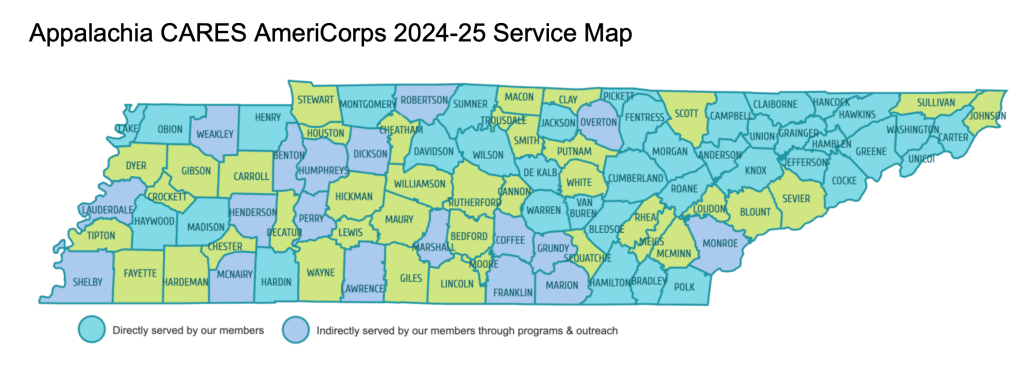Clinch-Powell RC&D Council among Ameriorps programs to lose funding
Published 1:45 pm Wednesday, May 7, 2025

- (Map courtesy Appalachia CARES)
|
Getting your Trinity Audio player ready...
|
Tennessee not-for-profits and families are experiencing DOGE funding cuts firsthand with the recent and abrupt termination of AmeriCorps grants nationwide.
Clinch-Powell Resource Conservation & Development Council was among the organizations impacted. Funding that was appropriated by Congress and awarded in fiscal year 2024 was rescinded with no cause or further explanation, despite contracts in place.
On April 28, 14 of 21 AmeriCorps programs in Tennessee received a memo from Volunteer Tennessee stating: “Funding for your program has been terminated, effective immediately. Due to this decision by the federal government, the funding for your services has been eliminated…All of your program’s AmeriCorps service activities and member assignments related to this grant funding must stop immediately.”
Trending
Clinch-Powell’s Appalachia CARES program has operated with AmeriCorps funding since January 1996. With no notice, program staff were forced to terminate 33 active AmeriCorps members (18 others previously completed contracts) and eliminate an additional 30+ positions for members onboarding in May.
Some of these members had served nine months of a 12 month position. Others had recently relocated to Tennessee and now face a loss of income, housing, and career pathways.
Appalachia CARES program director Trenna Ricker McCauslin says, “AmeriCorps members take an oath of service and enter these positions in good faith and with civic integrity to make a difference.”
AmeriCorps provides a foot in the door for a career or a way to pay for college for some, and provides necessary household income for others. Appalachia CARES alumni are nurses, doctors, lawyers, engineers, executive directors, social workers, parents, teachers, veterans, contractors, park rangers, designers, and so much more.
The grant termination also has a far reaching, heartbreaking impact on communities across the state. Appalachia CARES members served 4,500+ individuals in the most vulnerable populations through housing initiatives, including Aging in Place, home repair, affordable housing assistance, and financial literacy, and another 9,100+ individuals through conservation initiatives like Tennessee State Parks trail and infrastructure maintenance, conservation, and youth experiential education.
Positions were pulled from 40+ Appalachia CARES community partners as a result of the funding termination. After sharing the news in a virtual team meeting on April 28, Clinch-Powell staff continue to support members and sites through this gut wrenching process.
Trending
“I’m forever grateful to have been a part of such an inspiring community of people. It is such an honor to have taken the pledge to serve. Despite the anger and frustration that many of us harbor—I remain hopeful for the future and that we will rise above this,” says Jillian Jones, Appalachia CARES AmeriCorps member serving at Morristown-Hamblen Central Services whose term was cut short. “The spirit of service will never be taken from us.”
Appalachia CARES was so much more than a grant program – it was a carefully curated network of organizations and individuals with decades of community investment and knowledge, and it was just ONE of more than 1,000 programs eliminated nationwide.
“We often say that we are the force that AmeriCorps “built” because of the dedicated, talented, amazing Americans that set aside a year of service to do good in their community. Over the years they helped us stand up and bring to life programs that have changed thousands of lives through housing programs, community development programs, and economic development programs,” says Clinch-Powell Executive Director, Lindy Turner.
Clinch-Powell staff express the highest gratitude for all individuals who have served in the Appalachia CARES program over the years and remind them their service and sacrifice has made a difference and left a lasting legacy in their communities.





